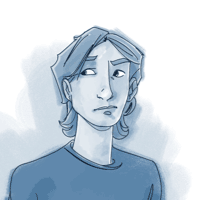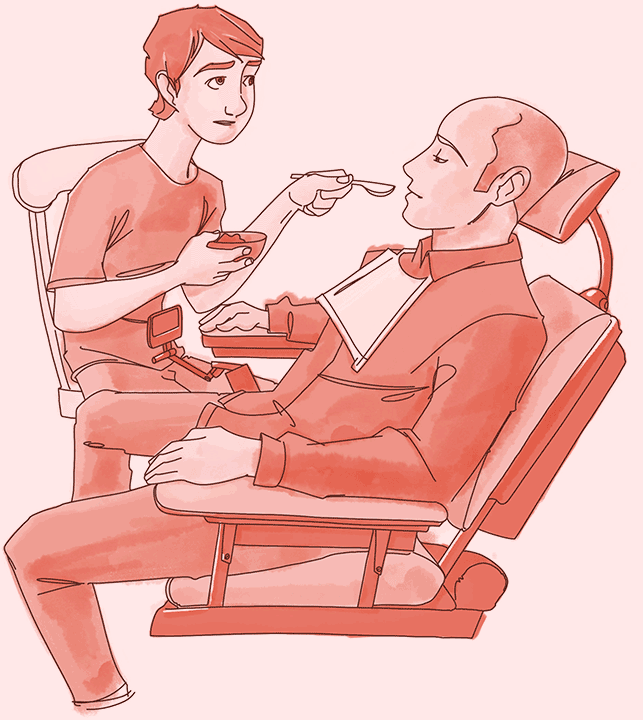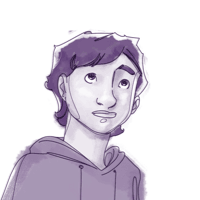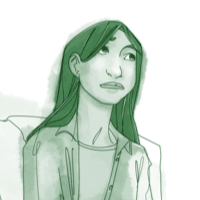Caregiving
“It’s challenging. It’s just kind of…it’s always there reminding you, kind of just sort of that sort of thing. You kind of have to put your own care aside because you really have to be there to help out.”
This 14-year-old helps take care of his dad with ALS. He has been doing a lot of things to help his dad, including helping him get dressed or move around from chair to bed. Sometimes he helps his dad bathe. Some people think of these kinds of activities as “caregiving”—but many kids, like yourself, think: Wait, I’m a caregiver? What does THAT mean?
Let’s see what Ian had to say about being a caregiver:

Ian
Ian was always a caregiver. Some of his earliest memories were picking things up for his dad, pushing his wheelchair and bringing him something to drink. It was just normal to Ian, the way their family was. He always knew about ALS. But over time, the caregiving became harder and took its toll.
When Ian’s dad could not roll over, or get up from bed or a chair, Ian had to help his mom lift and move his dad—even in the night. Other times, Ian would have to get up and help his dad go to the bathroom, which was the worst. Ian would program his dad’s communication device and prepare special liquids for his dad. There were other people who helped –truthfully, his mom did the most and they had a part-time caregiver to help—but getting up in the night kept getting harder and harder. Ian started falling asleep in class, although he tried hard not to. He even ended up being late to practice. Although his friends knew about ALS, being a caregiver sometimes made Ian feel weird. It felt like he grew up too fast. Almost like he missed his childhood. He was not like other kids and had a hard time talking about helping his dad go to the bathroom with other kids, kids who did not have to help their dads go to the bathroom.
Adults, like researchers and health care providers, often refer to kids who provide care or assistance to someone as “young caregivers” or “young carers.” But that doesn’t mean you have to call yourself a “young caregiver.” In fact, you don’t have to call yourself anything—you can just be you!
I would call myself a caregiver because I do more than a normal kid would do for their parent. I help a lot. It is like a job sometimes.
Being a caregiver does not simply mean that you clean the house or your room (which of course you are doing, right????). Being a caregiver means that you are doing something to help or take care of another person, which may be a parent, or grandparent, or another family member.
Here is a list of the things kids told us they do to care for a family member with ALS:
- Setting up, managing, and supporting communication devices
- Talking to the doctor for the family member living with ALS
- Assisting with preparing food and feeding the person living with ALS
- Tracking and administering medication
- Cleaning and managing respiratory equipment
- Engaging with range of motion exercises with the person living with ALS
- Cleaning drool and helping with oral hygiene
- Transferring and bathing

Some kids are caregivers, but not all the time, like Bradley.

Bradley
Bradley did not live with his dad, so did not feel like he was a real “caregiver.” He would go to his dad’s house every day after school and help him get around and fix dinner, but that was not really being a caregiver. He was just being a son to his dad.
His sister didn’t do anything and barely even mentioned their dad. His brother drove his dad places and helped out with his dad’s finances. Bradley saw his brother as the caregiver, but not himself. One night, Bradley got a call from his dad at 1 in the morning. The windows were open, and it had gotten really cold in the room. Could Bradley ride his bike over and shut the windows? Bradley hopped on his bike and took care of the windows. It was hard to wake up, but knowing that he could take care of his dad—and that his dad had reached out to him—ade Bradley feel so good about himself.
Still others, like Lara, are not currently doing anything to provide care, even though they want to help.

Lara
Lara does very little to help her uncle. Every time they go to his house, he seems to get worse. She wants to help and has, at times, helped him get around. But there are so many people hovering around him, that she does not do much. It’s OK, but she wants to feel like she is being a part of it and being a good niece. Everyone says not to worry, and that she is too young, but Lara doesn’t think so. She wants to help.
Bradley and Lara show us how caregiving is experienced in different ways. Just like ALS is different in all people, being a caregiver is different as well.
Did you know: In the National Family ALS study, almost ⅓ of families had a youth in the home who did things to help care for a family member.
Continue the Journey
Grief & Loss